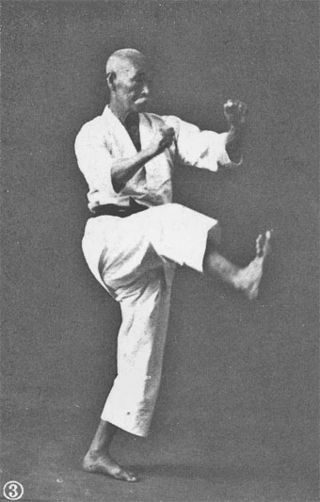
Karate (空手), also karate-do, is a martial art developed in the Ryukyu Kingdom. It developed from the indigenous Ryukyuan martial arts under the influence of Chinese martial arts. While modern karate is primarily a striking art that uses punches and kicks, traditional karate also employs throwing and joint locking techniques. A karate practitioner is called a karate-ka (空手家).
Keigo Abe was a prominent Japanese master of Shotokan karate who founded the Japan Shotokan Karate Association in 1999 and is its Chief Instructor. He held the rank of 9th dan in karate, was a direct student of Masatoshi Nakayama (1913–1987), and was a senior instructor in the Japan Karate Association.
The Japan Karate Association is one of the oldest global Shotokan karate organizations in the world.
Terry O'Neill is an English actor and martial artist.
Frank Brennan, is a Shotokan karateka born on 6 May 1960 in the City of Liverpool. He was a British karate champion in the 1970s and 1980s, winning a wide variety of titles both as an individual and as part of the KUGB team. He remains a well-known and well-respected KUGB instructor and coach.
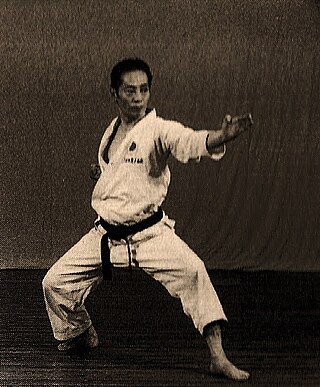
Tetsuhiko Asai was a prominent Japanese master of Shotokan karate of the Japan Karate Association (JKA), founder and Chief Instructor of the International Japan Martial Arts Karate Asai-ryu (IJKA), and founder of the Japan Karate Shoto Federation.
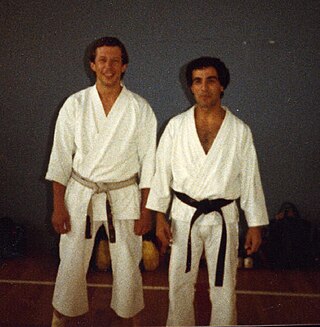
Dave Hazard is a British 7th Dan Karateka and instructor of Shotokan karate and was one of the few students present at the very beginning of British Karate. He is a former KUGB national champion and British team member. Like many of the early karateka he first trained in judo before starting karate in 1969 at the Blackfriers club in London, where he trained under Keinosuke Enoeda, Hirokazu Kanazawa, Kato and Takahashi.

Teruyuki Okazaki, was a tenth degree black belt in Shotokan Karate, as well as the founder and chief instructor of the International Shotokan Karate Federation (ISKF). Along with Gichin Funakoshi and Masatoshi Nakayama, Okazaki helped found the Japan Karate Association's instructor training program.
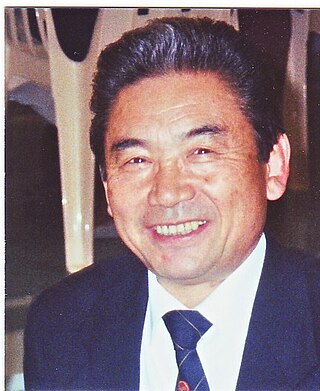
Takayuki Mikami is a Japanese master of Shotokan karate based in the United States of America. He holds the rank of 9th dan black belt in the art, awarded under the Japan Karate Association. In 1958, Mikami tied for first place in the All Japan Karate Championships. The following year, he became the All Japan champion in kumite (sparring) as well as kata (patterns). In 1961, Mikami won first place in kata again. He was also the first person to graduate from the Japan Karate Association's (JKA) instructor training program instituted by Gichin Funakoshi and Masatoshi Nakayama.

Yoseikan Karate (養正館空手) or Yoseikan Ryu Karate (養正館流空手) is the name given to the variant of Shotokan Karate taught at the Yoseikan Dojo in Shizuoka, Japan, under the direction of Minoru Mochizuki.

Yutaka Yaguchi was a Japanese karateka who was the Chief Instructor and Chairman of the International Shotokan Karate Federation (ISKF) Mountain States Region. He was born in Hiroshima, Japan, in 1932 and began karate training in 1952. He later tested under masters Gichin Funakoshi for his 1st dan black belt and Masatoshi Nakayama for his 2nd through 8th dan black belts. As one of the first graduates of the Japan Karate Association (JKA) Instructors' Training Program in 1959, he played an important role in the growth of JKA karate and the internationalization of Shotokan karate. Yaguchi first arrived in the United States on June 5, 1965. In 1974, Yaguchi founded the ISKF of Colorado, the regional headquarters for the Mountain States Region.
Andy Sherry was one of the most senior British practitioners of Karate and the retired chief instructor of the Karate Union of Great Britain. Sherry was unanimously convicted at Liverpool Crown Court of five criminal offences of a sexual nature relating to two victims, and sentenced to two years in prison and ordered to sign the Sex Offender Register for 10 years.
The Shotokan of England Karate Union (SEKU), founded in 1982 is a federation of Shotokan karate clubs in southern England, with about thirty clubs from Helston in Cornwall to Bromley in Greater London. The federation is led by Mick Dewey, 8th dan, who was a student of the late Keinosuke Enoeda.
JKA England (JKAE) is the official Japan Karate Association (JKA) organisation for Shotokan karate in England and Wales.

Keinosuke Enoeda was a Japanese master of Shotokan karate. He was a former Chief Instructor of the Karate Union of Great Britain. Enoeda was ranked 8th dan in Shotokan karate, and was widely renowned as a formidable karateka. Following his death, Enoeda was posthumously awarded the rank of 9th dan.
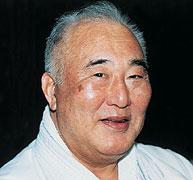
Taiji Kase was a Japanese master of Shotokan karate who was one of the earliest masters responsible for introducing this martial art into Europe. He taught his style of karate, Shotokan Ryu Kase Ha, in France from the late 1960s to the mid-1980s. In his later years, he travelled across the world teaching karate, but Paris remained his home. Kase held the rank of 9th dan in karate.

Hiroshi Shirai is a Japanese master of Shotokan karate. He is the founder of the Istituto Shotokan Italia, a subdivision of FIKTA and of the SCI. Shirai holds the title of Shihan and is responsible for taking the dan examinations within SCI and, together with Carlo Fugazza, for those within the FIKTA.

Hideo Ochi is a Japanese master of karate. He is ranked 9th Dan, and is a former Japan Karate Association (JKA) World Champion in kumite (sparring) and kata (patterns). He was also coach of the German national team and Chief Instructor for JKA Europe. In 1997, he received the Order of Merit of the Federal Republic of Germany.
Jack Green was one of the first three men in the UK to be graded to black belt in Shotokan karate, was an original member of the KUGB, and was their first national kumite champion.
Stan Schmidt was a South African master of Shotokan karate. Along with others, such as Norman Robinson, he was an early practitioner of Shotokan karate in South Africa and his establishment of the South African branch of the Japan Karate Association (JKA) in 1965 after training in Japan, along with his subsequent promotion of the art in South Africa, earned him the appellation of 'The Father of South African Karate'. In 1963, he was one of the first westerners to be invited into the JKA's famous Instructor Class in the Tokyo Honbu dojo and he was later one of four non-Japanese karateka to sit on the JKA's international Shihankai. He was also the first non-Japanese karateka to attain 7th dan from the JKA and also the first to attain 8th dan. Today, he is the highest ranking non-Japanese karate master of that organization. He is also known for his acting roles in several martial arts films of the 1970s and 1980s.











